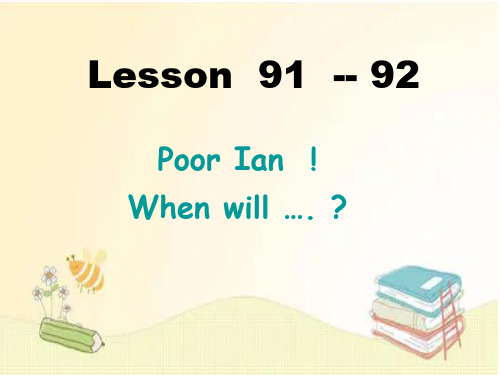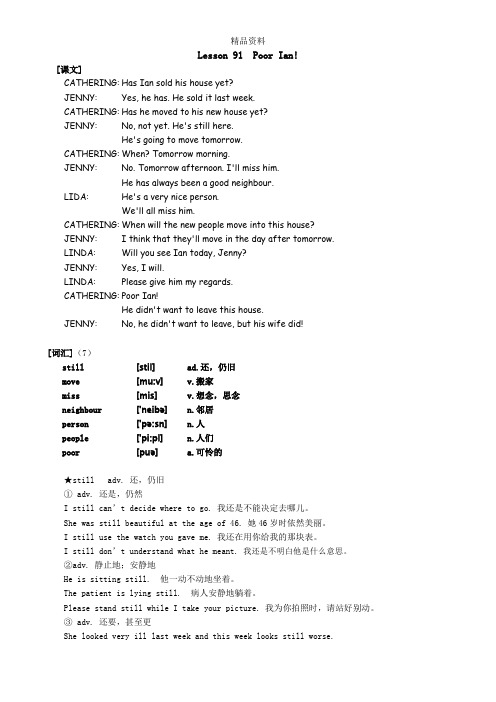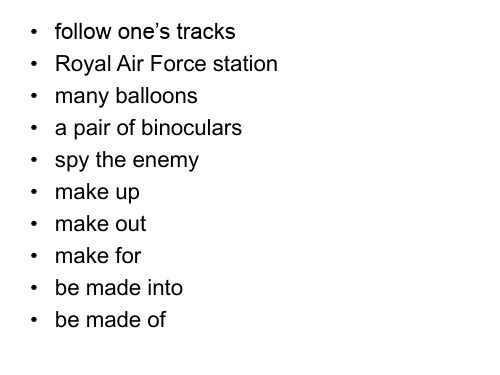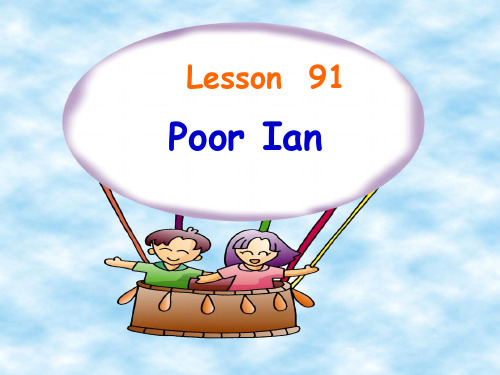lesson92一般将来时
新概念英语第一册91-92课笔记

新概念英语第一册91-92课笔记-CAL-FENGHAI.-(YICAI)-Company One1Lesson 91 Poor Ian![课文]CATHERING: Has Ian sold his house yet?JENNY: Yes, he has. He sold it last week.CATHERING: Has he moved to his new house yet?JENNY: No, not yet. He's still here.He's going to move tomorrow.CATHERING: WhenTomorrow morning.JENNY: No. Tomorrow afternoon. I'll miss him.He has always been a good neighbour.LIDA: He's a very nice person.We'll all miss him.CATHERING: When will the new people move into this house?JENNY: I think that they'll move in the day after tomorrow.LINDA: Will you see Ian today, Jenny?JENNY: Yes, I will.LINDA: Please give him my regards.CATHERING: Poor Ian!He didn't want to leave this house.JENNY: No, he didn't want to leave, but his wife didstill [stil] ad.还,仍旧move [mu:v] v.搬家miss [mis] v.想念,思念neighbour ['neibə] n.邻居person ['pə:sn] n.人people ['pi:pl] n.人们poor [puə] a.可怜的★still adv. 还,仍旧① adv. 还是,仍然I still can’t decide where to go. 我还是不能决定去哪儿。
新概念1第92课

5.She drove to London yesterday. _________________________________ 6.She telephoned him yesterday. _________________________________ 7.He had a shave yesterday. _________________________________ 8.She swept the floor yesterday. _________________________________
2.She will come this evening.
__________________________________
3.It will snow tonight.
__________________________________
4.He will not believe me.
__________________________________
课堂练习
(复习L91-L92)
Ⅳ Rewrite the sentences according to the requests. (改写下列句子) 1. Lucy and I have had lunch. (改为否定句) ___________________________________________________ 2. They have seen the film. (改为一般疑问句,并做出否定回答) __________________________________________________ 3. Jack has gone to England. (改为否定句) ___________________________________________________ 4. Have you read this book yet? (改为肯定句) ___________________________________________________
新概念一 lesson91-92 (完整版)

New words and expressions
• poor [ puE ]
adj.
3)笨拙的,差劲的
poor jokes 差劲的笑话
a poor excuse 笨拙的借口
New words and expressions
• poor [ puE ]
adj.
3)笨拙的,差劲的 sth
be poor at 不擅长….. doing sth eg: My daughter is poor at swimming.
( D)7.Mr smith _______________to Tokyo and he will be back in
a week • A. has been B. has visited C. has sent D. has gone
( B)8.They___________________ China for two years
Lesson 91 -- 92
Poor Ian ! When will …. ?
new words
• 1 believe [bi'li:v] v.相信,认为 • 7 because [bi'kɔz] conj.因为
• 2 may [mei] (用于请求许可)可以 • 8 retire [ri'taiə] v.退休
new words
New words
still [ stil ]
person [ `pE:sEn ]
adv.还,仍旧 move [mu:v ]
v.搬家 miss [ mis ]
n.人 people [ `pi:pEl]
n.人们
v.想念,思念
poor [ puE ]
新概念英语第一册91-92课笔记.doc

Lesson 91 Poor Ian![课文]CATHERING: Has Ian sold his house yet?JENNY: Yes, he has. He sold it last week.CATHERING: Has he moved to his new house yet?JENNY: No, not yet. He's still here.He's going to move tomorrow.CATHERING: When? Tomorrow morning.JENNY: No. Tomorrow afternoon. I'll miss him.He has always been a good neighbour.LIDA: He's a very nice person.We'll all miss him.CATHERING: When will the new people move into this house?JENNY: I think that they'll move in the day after tomorrow.LINDA: Will you see Ian today, Jenny?JENNY: Yes, I will.LINDA: Please give him my regards.CATHERING: Poor Ian!He didn't want to leave this house.JENNY: No, he didn't want to leave, but his wife didstill [stil]ad.还,仍旧move [mu:v]v.搬家miss [mis]v.想念,思念neighbour ['neibə] n.邻居person ['pə:sn] n.人people ['pi:pl] n.人们poor [puə] a.可怜的★still adv. 还,仍旧① adv. 还是,仍然I still can’t decide where to go. 我还是不能决定去哪儿。
新概念英语第二册:第92课课文详解及语法解析

【导语】新概念英语⼀共144课。
整本书⽆论是语法还是词汇,题材还是语句,都有其出彩之处。
正是因为如此,新概念英语更是经久不衰,深受⼴⼤英语学习者的喜爱。
为您整理了“新概念英语第⼆册:第92课课⽂详解及语法解析”,希望可以帮助到您! 课⽂详注 Further notes on the text 1.ask for trouble,⾃找⿇烦,⾃讨苦吃(多⽤于⼝语)。
You shouldn't have been so rude to her. You are asking for trouble. 你不该对她那么粗鲁。
你这是⾃找⿇烦。
The boss seems to be annoyed. To talk to him now is to ask for trouble. ⽼板似乎在⽣⽓。
现在找他谈话是⾃讨苦吃。
2.I don't think the windows need cleaning at this time of the night. 我看不必在夜⾥这个时侯擦窗⼦吧。
(1)有些动词如 think, believe,expect,suppose 等后⾯跟表⽰否定意思的宾语从句时,否定词not 往往⽤在主句中,但译成汉语时否定意义应在宾语从句中。
我们⼀般不说 I think Mary won't come this evening,⽽说 I don't think Mary will come this evening。
⼜如: I don't believe he is still in London. 我相信他已不在伦敦。
(2)need cleaning 的含义相当于 need to be cleaned。
need 表⽰“需要”时,后⾯接的动名词有被动的含义(cf.第44课语法): The strap needs mending. 这提包带需要修理。
一般将来时讲解

般将来时讲解一般将来时:一、一般将来时的定义:一般将来时表示将来某一时刻的动作或状态,或将来某一段时间内经常的动作或状态。
常常和表示将来的时间状语连用。
女口:tomorrow (明天),next week (下周);in the future (将来)等。
一般将来时由助动词shall (第一人称),will (第二、三人称)动词原形构成。
美式英语则不管什么人称,一律用will。
或用主语+be动词+ going to 动词.二、一般将来时表示方法:1.用will 或shall 表示“助动词will或shall+动词原形”这一形式,表示将来发生的事情,用于征求对方的意见或表示客气的邀请。
在口语中will 用于所有人称,书面语中第一人称常用shall [其实will也可以用到】。
如:①Tomorrow will be Sunday. 明天就是星期天。
②The rain will stop soo n.雨很快就要停了。
③Shall we go there at five?我们五点钟去那儿?4 ④ Will you please ope n the door?请你把门打开?2.用be going to结构表示"be going to+动词原形”用来表示事先考虑过的将要发生的动作以及已有迹象表明必将要发生的某事(有一个先兆),意为“打算;就要”。
如:①We're going to meet outside the school gate 我们打算在校门口见面。
②Look! It's going to rain. 瞧!快下雨了。
3.用现在进行时表示表示位置转移的动词(如:go, come, leave, start, arrive等),可用现在进行时4.表示将来时。
如:①Uncle Wang is coming. 王叔叔就要来了。
②They're leaving for Beijing.他们即将前往北京。
新概念英语第1册第91-92课重点语法和词汇讲解

新概念英语第1册第91-92课重点语法和词汇讲解新概念英语第1册第91-92课重点语法和词汇讲解导语:有时候搬家不是因为想离开,而是不得不离开,下面是一篇关于这方面的英语课文,欢迎大家阅读。
Lesson 91 Poor Ian!可怜的伊恩!Listen to the tape then answer this question.Who wanted to sell the house?听录音,然后回答问题。
谁想卖房?Mrs Smith: Has Ian sold his house yet?凯瑟琳:伊恩已指他的房子卖掉了吗?Mrs Brown: Yes, he has. He sold it last week.詹尼:是的,卖掉了。
他上星期卖掉的。
Mrs Smith: Has he moved to his new house yet?凯瑟琳:他已经迁进新居了吗?Mrs Brown: No, not yet. He’s still here. He’s going to move tomorrow.詹尼:不,还没有。
他仍在这里。
他打算明天搬家。
Mrs Smith: When? Tomorrow morning?凯瑟琳:什么时候?明天上午吗?Mrs Brown: No. Tomorrow afternoon. I’ll miss him. He has always been a good neighbour.詹尼:不,明天下午。
我会想念他的。
他一直是个好邻居。
Mrs Green: He’s a very nice person. We shall all miss him.琳达:他是个非常好的人,我们大学都会想念他的。
Mrs Smith; When will the new people move into this house?凯瑟琳:新住户什么时候搬进这所房子?Mrs Brown: I think that they will move in the day after tomorrow.詹尼:我想他们将会在后天搬进来吧。
新概念第一册Lesson 91-92知识点及拓展

Lesson 91-92Poor Ian!CATHERING: Has Ian sold his house yet?JENNY: Yes, he has. He sold it last week.CATHERING: Has he moved to his new house yet?JENNY: No, not yet. He's still here. He's going to movetomorrow.CATHERING: When? Tomorrow morning?JENNY: No. Tomorrow afternoon. I'll miss him.He has always been a good neighbour.LIDA: He's a very nice person. We'll all miss him. CATHERING: When will the new people move into thishouse?JENNY: I think that they'll move in the day aftertomorrow.LINDA: Will you see Ian today, Jenny?JENNY: Yes, I will.LINDA: Please give him my regards.CATHERING: Poor Ian! He didn't want to leave this house.JENNY: No, he didn't want to leave, but his wife did!1. Has Ian sold his house yet?Has he moved to his new house yet?--yet 己经,还(疑问句,否定句)--already (肯定句)--My father has already come home form work.(already置于助动词与实义动词之间)--Has your father come home yet?(yet一般放在句末)--My father hasn't come home from work yet.2. He sold it last week.一般过去时,强调“上周”这个时间所发生“卖房”的这个动作。
新概念英语第一册91-92课讲课讲稿

★miss v. 想念,思念 ① v. 想念,惦念
• 我想你 • I missed you.
• I’ll miss him. = I will miss him • I miss home very much. I miss you because I missed you.
式persons people 通常是人的统称。
• When will the new people move into this house? move to = move into 搬进
people = neighbours 她是这个职位的合适人选。 She’s the right person for this job. 公园里有很多人。 There’re a lot of people in the park.
• He’s going to move tomorrow. be going to do 计划、打算做某事。bour. 现在完成时
指Ian自从在这住开始到现在一直都很好 • He’s a very nice person. 表达人的人品很好可以用good或nice。 person 强调的个体的人,可以有复数形
• He is sitting still. • 他一动不动地坐着。 • 病人安静地躺着。
• The patient is lying still.
• ★move v. 搬家;感动 • 这个故事感动了我。
• This story moves me. • move to 搬到……地方 • move in 搬进 • move out 搬出来 • move away 搬走 • 我们下个月将搬到乡下
Lesson92-94(课件)新概念英语第一册【05】

eg: When will you fly to Tokyo ?
3.常用的时间状语 (1)tomorrow(morning, afternoon, evening)
明天(上午,下午,晚上)
(2)next (year, month, week) 明年/ 下个月 / 下周
词组
1.隔壁邻居 2.飞往某地 3.下个月 4.大下个月 at the moment
6.一周前 7.返回某地 8.大下周 9.曾经去过某地 10.呆在家里
next door neighbour fly to sp. next monty the month after next5.此刻
a week ago return to sp. the week after next have been to sp. stay at home
2.fly v.飞行 (-flies-flying-flew-flown) n.苍蝇(flies)
词组:fly to sp.飞往某地 =go to sp. by plane/air
eg: He__f_le__w__(fly) to Spain a week ago. He __w_i_l_l _f_ly__(fly) to London next week.
won’t
I will not fly to New York next month.
shan’t
(3) 一般疑问句 :Shall\Will+主语+动词原形? eg: I will fly to New York next month.(一般疑问句) Will you fly to New York next month? Yes, I will. No, I won’t.
新概念第一册第91-92课重点知识

Lesson 91-92 Has Ian sold his house yet?伊恩把他的房子卖了吗?Has he moved to his house yet?他搬到他的房子里去了吗?He has always been a good neighbour.他一直都是一个好邻居。
We will all miss him我们都会想念他的。
When will the new people move into this house?什么时候新的人会搬进这栋新房?I think they will move in the day after tomorrow.我想他们会在后天搬进来。
注意这里有一个新词:will,以前学的be+going+ to+do表示一般将来时,未来打算或计划做什么,will也是一般将来时,表示未来即将做什么。
Please give him my regards.请代我问候他。
现在完成时的过去分词记忆:cut-cut-cut,put-put-put,read-read-read,set-set-set,shut-shut-shut;do-did-done,come-came-come,giv e-gave-given,swim-swam-swum,take-took-taken;eat-ate-eaten,go-went-gone,rise-rose-risen,see-sa w-seen,speak-spoke-spoken.你能找出他们的规律吗?千万不要死记硬背,找出规律是门道。
Lesson 92 When will

一般将来时 一般将来时表示将来某一时刻的动作或状态,或将来某一 段时间内经常的动作或状态。常常和表示将来的时间状语 连用。
shall/ will
结构
肯定句:主语 + shall/will + 动词原形... 否定句:主语 +ቤተ መጻሕፍቲ ባይዱshall/will + not + 动词原形... (shan’t won’t) 疑问句:Shall/Will + 主语 + 动词原形...? 疑问代词/疑问副词 + shall/will + 主语 + 动词原形...?
He telephoned me . (变成一般将来时)
肯定句:
He is going to telephone me . 否定句: He isn’t going to telephone me . 一般疑问句: Is he going to telephone me ? 肯定回答: Yes, he is . 否定回答: No, he isn’t .
Lesson will …
92
When ?
一背诵下列时间短语
today this 上 this 午 this 晚 morning afternoon 今天 tomorrow 明天 the day after tomorrow后天 the day after tomorrow in the morning 后天早上 the day after tomorrow in the afternoon 后天 下午 the day after tomorrow in the evening 后天 傍晚 the night after next 后天晚上 今天早 tomorrow morning 明天早上 今 天 下 tomorrow afternoon 明天下午
新概念英语第二册Lesson92(共24页)

letters. • 我记得已把信寄了。
• Don't forget to ask Tom. • 别忘记去问汤姆。 • I forgot to ask Tom. • 我忘了去问汤姆。 • Have you forgotten meeting / having met
(3)格调,风格,气氛: Her dress has a bright tone. 她的衣服格调明快。
The building has a foreign tone. 这座建筑物有一种异国情调。
• ★ shed (1) n. 棚子、小屋、存放地 • a cattle shed 牛棚 • a wood shed 木棚子
• I regretted saying it almost at once.
• 我几乎马上就后悔说了这话。
• We regret to inform you that you needn't come here next week.
• 我们很遗憾地通知你下周不用来这儿了。
• Remember to post the letters. • 要记着/别忘记去邮信。
She's going to help us and so is Jim. 她将帮助我们,吉姆也将帮助我们。(重复助动词is)
He likes his beer and so does Frank. 他喜欢啤酒,弗兰克也喜欢。(加助动词 does)
我看不必在夜里这个时侯擦窗子吧。
(1)有些动词如 think, believe, expect, suppose 等后面跟表示否定意思的宾语从句时,否定词not 往往用在主句中,但译成汉语时否定意义应在宾语 从句中。我们一般
新概念第一册英语Lesson91-Lesson92课件

Poor Ian !
• CATHERINE:Has Ian sold his house yet? JENNY:Yes, he has.
② v. 错过 miss the bus/train 错过公交车/火车 He got up late and he missed the bus.
★ person n. 人 (可数名词)
a nice/good person 好人 ★ people n. ①人们(集合名词,单数形式,复数意义, 后接复数谓语) A lot of people are dancing in the park.
一般将来时(Lesson37)
be going to +动词原形
next week
What is he going to do next week? He is going to go fishing.
What is she going to do? She’s going to shop/ go shopping...
•
want to do sth
• JENNY:No, he didn't want to leave,
• but his wife did!
•
助动词表示强调
Questions
• When will the new people move into this house?
• Will Jenny see Ian today? • Did Ian want to leave this house? • Who wants to leave this house?
新概念英语第一册Lesson87_92重点学习内容

新概念英语第一册Lesson87~92重点学习内容新概念英语第一册Lesson87~88重点学习内容一、重要句型或语法现在完成时表示过去发生的动作对现在造成的影响或结果,基本形式为have/has done。
本课侧重的是标志性词语yet的用法和不规则的过去分词。
如:Have your mechanics finished yet?二、课文主要语言点Is my car ready yet? 1)ready,准备好了的。
2)yet用于疑问句,起加强语气作用。
What's the number of your car? It's LFZ 312G. 1)What's the number of ...用来询问某物的号码,如:What's the number of your phone?,相当于What's your phone number? 2)汽车牌照的号码只要按顺序逐个读出即可。
When did you bring it to us? I brought it here three days ago. 1)此处动词采用一般过去时,是因为他们在讨论的是三天前发生的事情。
2)bring sth. to sb.,把某物带给某人。
3)可复习ago表示过去时间的用法。
Ah, I remember now. 注意remember的读音和拼写。
Have your mechanics finished yet? No, they're still working on it. 1)finish,完成,结束。
如果后面再接动词,要用doing,如finish working。
2)此处yet用来加强语气。
3)still,仍然,用来加强语气。
4)work on sth.,忙于。
Let's go into the garage and have a look at it. 1)Let's用来引导祈使句,后面要接动词原形。
裕兴新概念英语笔记:Lesson 92 When will

Lesson 92 When will…?Exercise A:Example:It will rain tomorrow.It'll rain tomorrow.1.He will arrive tomorrow morning.He'll arrive tomorrow morning.2.She will come this evening.She'll come this evening.3.It will snow tonight.It'll snow tonight.4.He will not believe me.He'll not believe me.Exercise B:Example:It rained yesterday.Yes, and it will rain tomorrow,too.1.It snowed yesterday.Yes, and it will snow tomorrow, too.2.He got up late yesterday.Yes, and he will get up late tomorrow, too.3.He arrived late yesterday.Yes, he will arrive late tomorrow, too.4.He finished work late yesterday.Yes, he will finish work late tomorrow, too.5.She drove to London yesterday.Yes, she will drive to London tomorrow, too. 6.She telephoned him yesterday.Yes, she will telephone him tomorrow, too.7.He had a shave yesterday.Yes, he will have a shave tomorrow, too.8.She swept the floor yesterday.Yes, she will sweep the floor tomorrow, too. Listening---- Edelweiss (German Folksong)Edelweiss, edelweissEvery morning you greet meSmall and whiteClean and brightYou look happy to meet meBlossom of snowHay you bloom and growBloom and grow foreverEdelweiss, edelweissBless my homeland foreverSmall and whiteClean and brightYou look happy to meet meBlossom of snowMay you bloom and growBloom and grow foreverEdelweiss, edelweissBless my homeland foreveredelweiss n. 雪绒花Every morning you greet me*greet vt. 向…问候,迎接.打招呼eg. He greeted us by saying, “Good afternoon.”他向我们道午安。
新概念第一册各课语法项目

所有格形式,代词所有格和名词所有格的区别及用法
Lesson83-84
1语法:现在完成时have+ -ed
2时态:现在完成时进行时,将来时对比
3句型:-Have you/he/she/they had...
-Yes, I/they have. / No, I/they haven’t. -Yes, he/she has. / No, he/she hasn’t.
2句型:-When did you/he/she/it/you/they do...
-I/He/She/It/We/Theydid…last.../...ago
3情态动词的否定疑问句表示请求
Lesson7-8
复习BE动词,教授BE动词的缩写形式;
Eg :I am = I’m
重点教授特殊疑问句:What’s ….job
2句型:-Whose is it
-It is my/your/his/her/its/our/your/their +名词.
= -It is mine/yours/his/hers/its/ours/yours/theirs.
= -It belongs to me/you/him/her/it/us/you/them.
-I/He/She/It/We/Theydid…last.../...ago
Lesson5-6
复习BE动词的用法:
重点句型:介绍别人时:This is… and This is …
特殊疑问句: what nationality…
4不定冠词:a / an
Lesson77-78
1时态:标志一般过去时的时间状语;
新概念第一册每一课重点总结

新概念一共144课,其中单课为课文,双课为语法和练习。
整本书是以单数课为正课,并附带有插图,而双数课则是针对单数课所讲的内容有针对性地进行练习。
学习目标:
(1)达到初中或高中一年级的英语水平
(2)掌握英语初级语法
(3)应对一般的日常对话
(4)掌握800至1200个单词,其中的800个词汇全部是英语日常用语中出现频率最高的词汇。
上册(1—68课)
上册所学单词在600左右,含有名词、形容词、动词及少数介词,其中名词占大多数,会学习到较多的生活用词。
'
语法点归纳:
(1) 1--68课本中出现的时态:
Lesson 31—34 现在进行时
Lesson 37--40 第一次出现be going to 的将来时
Lesson51—56 一般现在时
Lesson 67—76 为一般过去式
`
(
中册(69—106课),大约有300单词,包含名词、动词、形容词、副词、介词,其中所学的动词和副词会有所增加。
课文中出现的时态有:
|
Lesson 67—76 为一般过去式
Lesson 83—90 为现在完成时
Lesson 91—96 为一般将来时
下册(107—144课),大约有300个单词
语法点归纳:
1、L107-108形容词的比较级,最高级
2、L117-118时间状语从句和过去进行时
3、L121-122定语从句
4、、
5、L119-120 过去完成时
6、L139-140宾语从句
7、L141-144被动语态。
- 1、下载文档前请自行甄别文档内容的完整性,平台不提供额外的编辑、内容补充、找答案等附加服务。
- 2、"仅部分预览"的文档,不可在线预览部分如存在完整性等问题,可反馈申请退款(可完整预览的文档不适用该条件!)。
- 3、如文档侵犯您的权益,请联系客服反馈,我们会尽快为您处理(人工客服工作时间:9:00-18:30)。
根据所给动词/动词短语造句姓名:
rain过去式过去分词现在分词
1.正在下雨。
2.昨天下雨了。
3.已经下雨了。
4.明天将会下雨。
arrive 过去式过去分词
1.他们两天以前到的。
2.他们已经到了。
3.他们后天会到。
have a shave 动词原形动词的过去式动词的过去分词动词现在分词
1.他正在刮脸。
2.他每天都刮脸。
3.他昨天刮脸了。
4.他明天刮脸。
5.他打算五分钟以后刮脸。
sweep the floor 动词原形动词过去式动词过去分词
动词现在分词
1.她经常打扫地板。
2.她正在打扫地板。
3.她刚刚打扫了地板。
4.她昨天打扫了地板。
5.他明天早上将会打扫地板。
repair my car动词原形动词过去式动词过去分词动词现在分词
1.他们正在修理我的车。
2.他们已经修理完我的车了。
3.他们昨天修理的我的车。
4.他们后天会修理我的车。
时态结构及转换姓名:
现在进行时结构:
写一个肯定句:
变成问句:
肯定回答:否定回答:变成否定句:
一般过去时结构:
写一个肯定句:
变成问句:
肯定回答:否定回答:变成否定句:
现在完成时结构:
写一个肯定句:
变成问句:
肯定回答:否定回答:变成否定句:
一般将来时结构:
写一个肯定句:
变成问句:
肯定回答:否定回答:变成否定句:。
